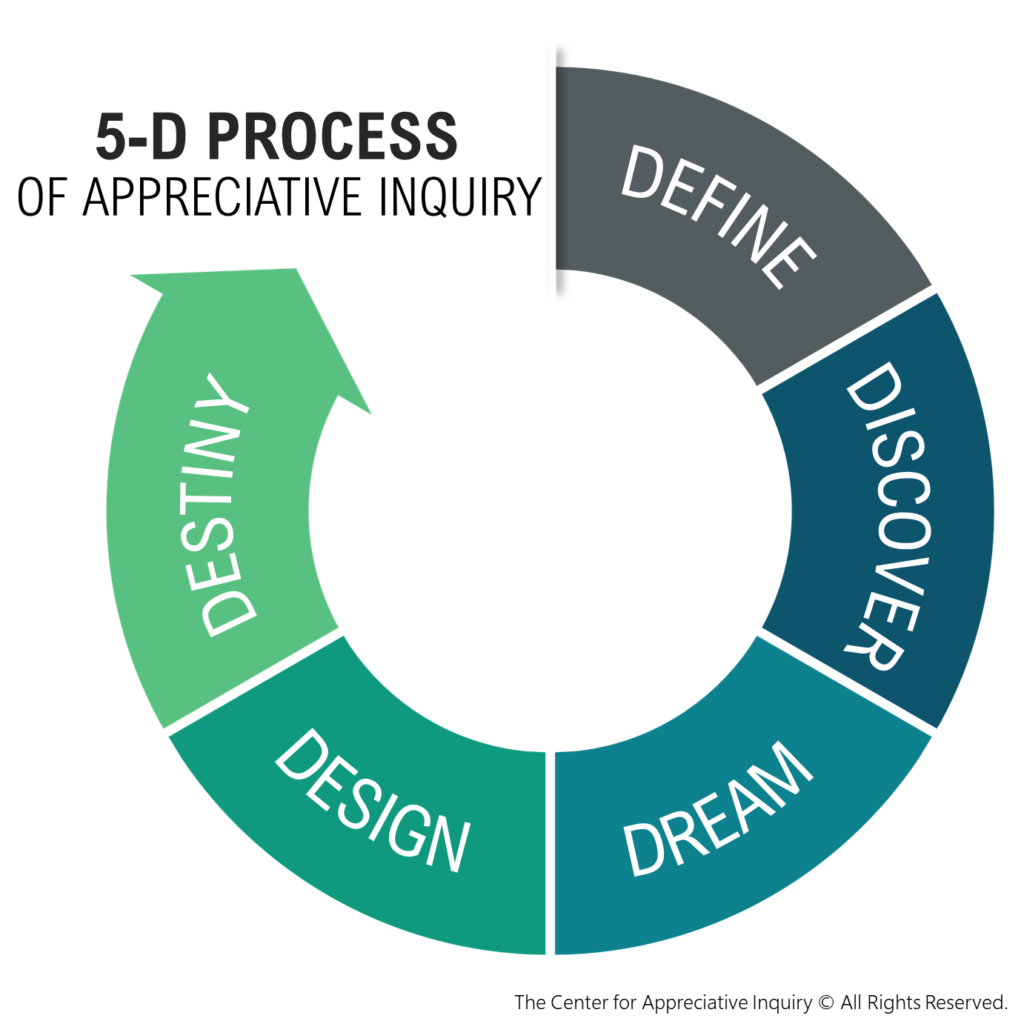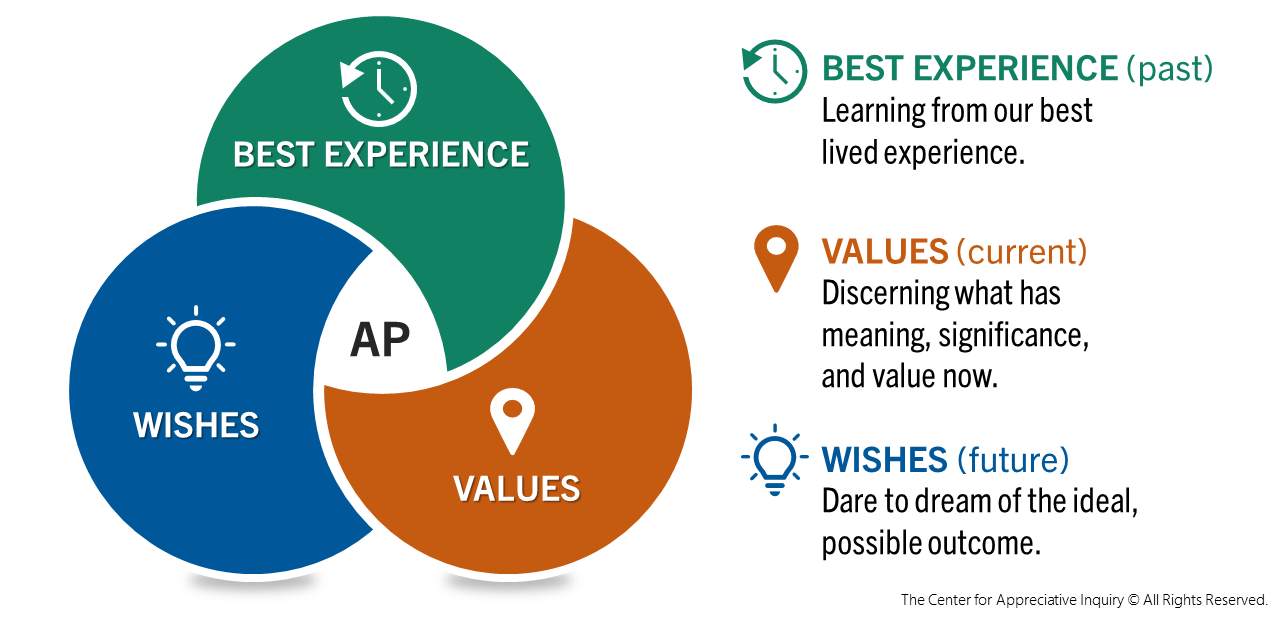 Appreciative Inquiry (AI) is an energizing and inclusive process that fosters creativity through the art of positive inquiry. It builds new skills in individuals and groups, develops new leaders, encourages a culture of inquiry, and helps create shared vision and purpose by building on an organization’s core values and strengths.
Appreciative Inquiry (AI) is an energizing and inclusive process that fosters creativity through the art of positive inquiry. It builds new skills in individuals and groups, develops new leaders, encourages a culture of inquiry, and helps create shared vision and purpose by building on an organization’s core values and strengths.
Appreciative Inquiry engagements are thoughtfully designed and delivered using the 5-D process consisting of: Define, Discover, Dream, Design, and Destiny. Unlike other change models that have a distinct beginning and end points, AI’s process is cyclical and invites ongoing exploration into new opportunities for learning, growth, and innovation.
DEFINE // Choose the affirmative topic of the inquiry.
There are infinite topics of exploration available to us at any given time and what we choose to focus on makes a difference. Define, the first phase in the Appreciative Inquiry process. involves choosing the positive focus of the inquiry – also referred to as the ‘Affirmative or Generative Topic’.
Affirmative topics do more than simply identify an area of inquiry, they also highlight what the person, group, or organization wants to see grow and flourish. Because problems and deficits do exist, selecting” an affirmative topic may require reframing issues and concerns into opportunities for exploration. Techniques such as paired inquiries, positive reframing, and problem-to-opportunity tree help individuals and groups define an affirmative topic.
Once selected, questions are crafted to invite exploration into the best experience, values, and wishes for the future as it relates to the affirmative topic. AI questions are unconditionally positive and generative – meaning the questions invite new ideas or images, provoke new action, and create shared meaning. Questions created in this phase are used to construct the interview guides and set the course and direction for the engagement.
DISCOVER // Inquire into positive moments and share stories.
Appreciative interviews are about discovery. Using the interview guides, individuals engage in paired interviews to evoke stories that illuminate an individual, organization, or community’s strengths and capabilities related to the Affirmative Topic. Unlike data or lists, positive stories stir imagination and generate excitement about what the individual, organization or community can accomplish in the future.

Appreciative questions evoke images of the ideal future and invite reflection on how to get there. A typical appreciative interview guide consists of three standard questions that explore: best experience (past), values (present), and wishes (future).
BEST EXPERIENCE // Learn from our best lived experience.
Tell me a story about a best experience you have had with your ______ (i.e., family, team, community, network, or another group). What made this experience a highlight for you? Please describe this experience in detail.
VALUES // Identify what has meaning and value to you now.
What things do you value about yourself, your work, your family, and your organization? What do you value most about the story you shared in the previous question?
WISHES // Dare to dream of the ideal, possible outcome.
What are your wishes for the future – for yourself, your work, your organization?
Next, participants share the highlights of the interviews and brainstorm a list of high-energy themes present in the stories that they heard. From their list, participants discuss and agree on a theme that they wish to explore further in the remaining phases.
DREAM // Create images of a preferred future.
This phase invites participants to dream of a preferred future in which the high points identified in their stories are being lived out daily. Participants are first invited to create a visual image of their dream using metaphors. Visual images can consist of anything – drawings, songs, skits, collages, dance, etc. Next, participants then transform their visual image into a word image – often referred to as a Provocative Proposition in Appreciative Inquiry.
Provocative Propositions bridge the best of ‘what is’ with participants’ intuition of ‘what might be’. It is provocative to the extent that it stretches the realm of the status quo, challenges common assumptions or routines, helps develop real possibilities for the group’s preferred future, and provokes action.
“Imagination is more important than knowledge. For knowledge is limited to all we now know and understand, while imagination embraces the entire world, and all there ever will be to know and understand.” Albert Einstein
DESIGN // Innovate ways to create the ideal future.
Building upon the provocative propositions, the Design phase looks at the practicalities needed to support participants’ vision of their preferred future. Items considered in this phase may include resources, policies, processes, and strategies. Questions explored in this phase are:
– What would have to be in place to create and support our ideal future?
– What will these ideas look like in action?
– How might we leverage our individual & collective strengths to make our vision a reality?
Participants create ‘Possibility Statements’ (actionable items) that consist of personal and organizational commitments, timelines, resources needed, and paths forward for implementing and sustaining their desired vision of the future. Time permitting, participants may have the opportunity to publicly announce how they will support the success of the initiatives created and presented.
DESTINY // Live out your design and make changes as needed.
The Destiny phase shifts the dream to reality. Using the Possibility Statements as a guide, participants live out their desired future by adhering to the commitments they made in the previous phase.
The Destiny Phase is ongoing. As stakeholders begin to live out their preferred future, adjustments to their Possibility Statements may need to be made. Stakeholders are encouraged to continue learning and improvising their Possibility Statements to achieve the outcomes they co-constructed in the previous phases.
Start creating more of what you want...
Get helpful AI information and resources.
Find certified AI professionals in your area.
Become a positive change agent.
AI events designed for all skill levels.
Content adapted from: Mohr, B. J. & J. M. Watkins, The Essentials of Appreciative Inquiry: A Roadmap for Creating Positive Futures, Waltham, MA: Pegasus Communications, Inc., 2002.

